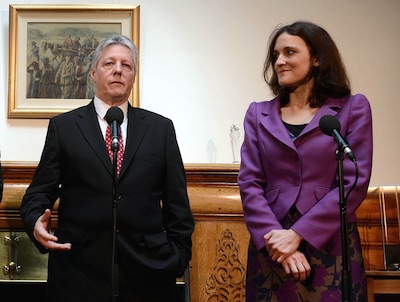
Crisis talks due to begin tomorrow in Belfast face an uphill battle amid serious attacks on the Six-County political process by both the British government and unionists over the past 48 hours.
Allegations that some elements of the Provisional IRA remain in existence have precipitated the current crisis, which has already seen the Ulster Unionist Party withdraw its single Minister from the power-sharing Stormont Executive. Sinn Fein has continued to insist the Provisional IRA is “gone away” and not “coming back”.
This Monday morning, Peter Robinson, leader of the Democratic Unionist Party, warned there would be no further meetings of the Executive unless in “exceptional circumstances”. Last week, he stopped short of collapsing the Stormont administration, but warned he would not allow “business as usual” until the IRA issue is resolved.
Today, the First Minister in the Executive announced an effective go-slow by allowing for meetings only in “exceptional circumstances”. He also said there would be no North/South ministerial meetings between the Belfast and Dublin administrations “in any of its formats”. He said his ministers would be focused on the talks that are due to begin tomorrow morning.
The DUP announced their decision in Stormont’s Great Hall as the speaker called Assembly members to enter the chamber following the summer recess. Robinson said if the talks don’t lead to a “satisfactory outcome”, his ministers would resign -- triggering either a new election, a deep-freeze or a complete end to the Stormont experiment.
Public sentiment in the North towards Stormont has become increasingly negative in the face of perennial deadlock and political corruption. A harder line from the DUP had appeared inevitable after the UUP were seen to have outflanked their unionist rivals late last month by becoming an ‘opposition’ party in time for the next Assembly election, which is due by next May.
Mr Robinson today described Stormont as “not fit for purpose”. He said that any election could not see a return to the present assembly arrangements as the DUP would not take part until a “fundamental and more wide ranging negotiation produced a system that could fully function”.
The other major issue due to be discussed at tomorrow’s talks is the failure to implement last December’s Stormont House Agreement and the ongoing dispute over welfare cuts. The talks, which will be held at Stormont House, will be chaired by British Direct Ruler Theresa Villiers.
On Saturday, a threat by Villiers to impose welfare cuts through direct-rule legislation at Westminster was seen as undermining both the talks and the Stormont regime itself.
Villiers claimed the move would be a “last resort” and that the British government could not stand by and let the situation “drag on indefinitely”.
She said the nationalist parties, who have blocked cuts to vulnerable members of society, still “have the choice” to back austerity.
“They can do what virtually every responsible government across the world has had to do in recent years ... including in the UK and Ireland ... and that is to make difficult choices to live within their means,” she said.
Robinson, whose party broadly supports the Tories on the welfare issue, cheered the move as another indication of a shift in power against Sinn Fein. He described it as a “dose of reality” and a “potential game changer”.
There was a relatively muted reaction from nationalists. Sinn Fein Deputy First Minister Martin McGuinness said that any move by the British government to impose its welfare cuts agenda over the heads of the Assembly and Executive would “seriously undermine devolution and the political institutions”.
“It would be a huge mistake,” he said. “It is wrong and unjust to punish those most in need. The parties supporting these Tory policies should reflect on the damage they will do to all our people.”
Speaking in Cambridge, 26-County Minister for Foreign Affairs Charlie Flanagan said the British move was “a departure from devolution” but refused to say if his government had any notice about the British action. “It is not something that is supported by the Irish government,” he said.
![[Irish Republican News]](https://republican-news.org/graphics/title_gifs/rn.gif)
![[Irish Republican News]](https://republican-news.org/graphics/title_gifs/harp.gif)

